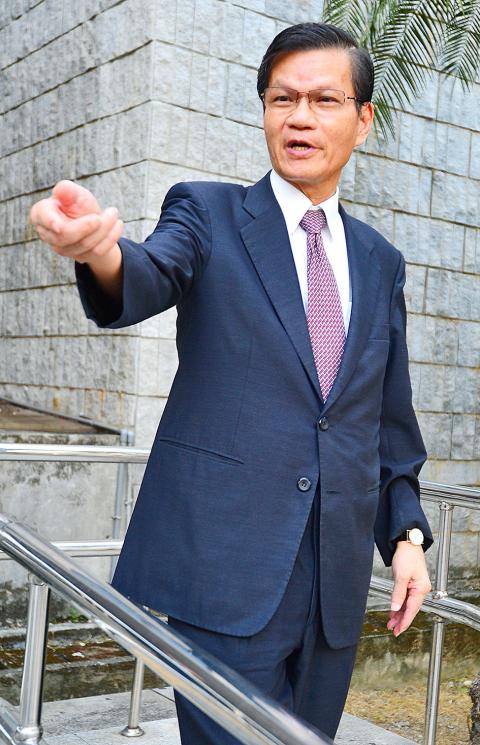Taipei prosecutors yesterday dropped insider trading charges against former Academia Sinica president Wong Chi-huey (翁啟惠), over alleged financial impropriety linked to biotech firm OBI Pharma Inc (台灣浩鼎).
It was one major hurdle cleared for Wong, who still faces corruption and misconduct charges brought against him by prosecutors in January last year.
The Shilin District Prosecutors’ Office said there was insufficient evidence of insider trading between Wong and 11 OBI Pharma executives, who said that they were acting on the advice of a securities firm broker when they sold Pharma shares in 2016.

Photo: Wang Yi-sung, Taipei Times
It was alleged that Wong and the executives had advance knowledge of unfavorable results in a double-blind clinical trial of a cancer drug, and sold the shares before the drop in share prices after the news was officially released.
It is the second time insider trading charges have been dropped in the case; the first was in January last year.
However, at the time the Taiwan High Prosecutors’ Office cited several issues and ordered prosecutors to reassess whether to proceed with the indictments.
The investigation into the sales of shares began in April 2016, with Wong, then-OBI Pharma chairman Michael Chang (張念慈) and other company executives summoned for questioning, which resulted in indictments against them.
Allegations of improper conduct began after Wong endorsed a new OBI Pharma cancer drug, despite discouraging clinical trial results in February 2016, and it emerged that his daughter was a major shareholder in the company.
The shares he sold belonged to his daughter and he was acting on her behalf.
In Wong’s case, the original indictments were divided into charges of insider trading and charges of corruption and misconduct as a public servant.
Prosecutors said their investigation found that on Feb. 21, 2016, a broker telephoned Wong to tell him of a rise in company share prices and suggested he sell.
“Wong was acting on the broker’s advice, which is not deemed insider trading,” prosecutors said. “The other company executives sold OBI shares on Aug. 28, 2016, after a meeting of biotech experts where the results of the clinical testing were discussed.”
However, the 11 executives, including Chang, did not participate in the meeting and it was decided to drop the insider trading charges against them,” the statement said.
Wong is a world-renowned biochemist and had been touted as a potential Nobel Prize candidate.
Wong’s offer of resignation, his second, was accepted by then-president Ma Ying-jeou (馬英九) on May 10, 2016.
Additional reporting by staff writer

A car bomb killed a senior Russian general in southern Moscow yesterday morning, the latest high-profile army figure to be blown up in a blast that came just hours after Russian and Ukrainian delegates held separate talks in Miami on a plan to end the war. Kyiv has not commented on the incident, but Russian investigators said they were probing whether the blast was “linked” to “Ukrainian special forces.” The attack was similar to other assassinations of generals and pro-war figures that have either been claimed, or are widely believed to have been orchestrated, by Ukraine. Russian Lieutenant General Fanil Sarvarov, 56, head

SAFETY FIRST: Double the number of police were deployed at the Taipei Marathon, while other cities released plans to bolster public event safety Authorities across Taiwan have stepped up security measures ahead of Christmas and New Year events, following a knife and smoke bomb attack in Taipei on Friday that left four people dead and 11 injured. In a bid to prevent potential copycat incidents, police deployments have been expanded for large gatherings, transport hubs, and other crowded public spaces, according to official statements from police and city authorities. Taipei Mayor Chiang Wan-an (蔣萬安) said the city has “comprehensively raised security readiness” in crowded areas, increased police deployments with armed officers, and intensified patrols during weekends and nighttime hours. For large-scale events, security checkpoints and explosives

A magnitude 7.0 earthquake struck off Yilan at 11:05pm yesterday, the Central Weather Administration (CWA) said. The epicenter was located at sea, about 32.3km east of Yilan County Hall, at a depth of 72.8km, CWA data showed There were no immediate reports of damage. The intensity of the quake, which gauges the actual effect of a seismic event, measured 4 in Yilan County area on Taiwan’s seven-tier intensity scale, the data showed. It measured 4 in other parts of eastern, northern and central Taiwan as well as Tainan, and 3 in Kaohsiung and Pingtung County, and 2 in Lienchiang and Penghu counties and 1

‘POLITICAL GAME’: DPP lawmakers said the motion would not meet the legislative threshold needed, and accused the KMT and the TPP of trivializing the Constitution The Legislative Yuan yesterday approved a motion to initiate impeachment proceedings against President William Lai (賴清德), saying he had undermined Taiwan’s constitutional order and democracy. The motion was approved 61-50 by lawmakers from the main opposition Chinese Nationalist Party (KMT) and the smaller Taiwan People’s Party (TPP), who together hold a legislative majority. Under the motion, a roll call vote for impeachment would be held on May 19 next year, after various hearings are held and Lai is given the chance to defend himself. The move came after Lai on Monday last week did not promulgate an amendment passed by the legislature that